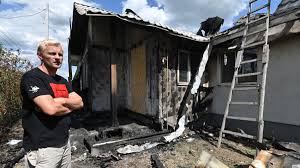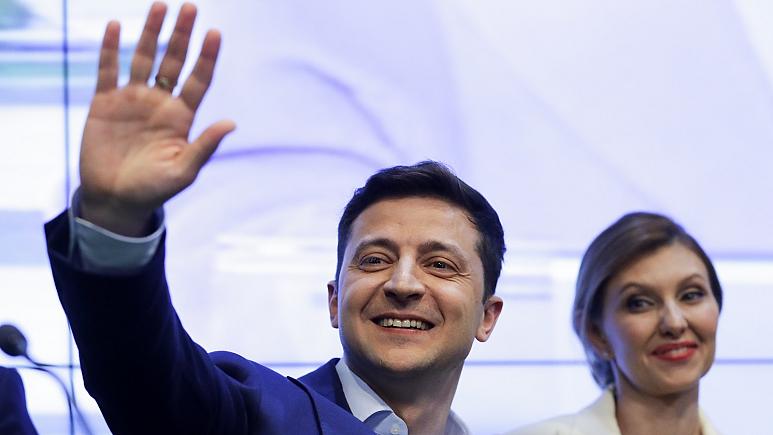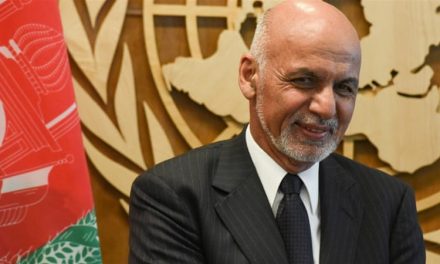Volodymyr Zelenskyy and his wife Olena
28 July 2020
Ukrainian president, Volodymyr Zelenskyy was elected in 2019 on the promise of wide-reaching reforms to battle corruption and improve the economy. In recent months, he has sacked and replaced the government for being inept. Zelenskyy does not want to wait long for results and expects quick and effective results from his ministers. Ukrainian voters do not want to wait either. Hence the frequent changes in the cabinet. Often, those who were dismissed were weak reformers and even weaker politicians, who did not know how to build communication with other political actors and did not know how to work with public opinion. Some experts expressed opinion that Zelenskyy needed people with more experience.
Former prime minister, Oleksiy Honcharuk, was fired in March, along with several of his ministers, the Ukrainian prosecutor general, Ruslan Riaboshapka, and other officials. Honcharuk and Riaboshapka were well-regarded in the West. They have since expressed their concern about the growing malign influence of powerful people on the country’s economy.
The nation’s political direction has become a concern for many Ukrainians.
The message many are receiving now is very different from the one of hope and pledges of reform they put their faith in at last year’s elections. The hope for a better future which prevailed when Zelenskyy was elected has gone. The government appears to be turning away from anti-corruption measures and western-style reforms.
The International Monetary Fund (IMF) recently provided Ukraine with a $5 billion (€4.4 billion) loan to battle COVID-19, but noted in a report that “reforms increasingly faced resistance from vested interests, and court rulings” were undermining “reform progress, especially in tackling corruption and financial sector reforms”.
At the beginning of July, the governor of the National Bank of Ukraine, Yakiv Smolii, handed in his resignation because it was difficult for him to put up with the political pressure and longstanding intimidation. Some experts fear that the independence of the Ukrainian National Bank is under pressure, which could jeopardise the country’s IMF loan.
The ex-head of customs, Maxim Nefyodov, himself publicly estimates the volume of smuggling at customs during his time as head to have been at 1.5-2 billion euros per year.

Vitaliy Shabunin house on fire
On July 23, the home of leading Ukrainian anti-corruption activist Vitaliy Shabunin was badly damaged in an apparent arson attack. Luckily, he and his young family were not at home at the time, while his parents escaped the blaze unharmed.
“The culprits must be found and punished,” Zelenskiy said in a statement, adding that such attacks “cast a shadow on the reputation of our state, on our institutions of power, and especially on our law enforcement agencies.”
This is not an isolated incident. Activists, journalists, and other individuals who expose corruption often face assaults and threats. An investigative journalist in Cherkasy in central Ukraine was killed last June, while the nation’s former central banker who had taken on oligarchs had her home burned down in September.
Ukrainians blame he culture of corruption for the country’s woes. Zelenskyy has repeatedly failed to act in defense of anti-corruption figures, and has dismissed numerous reformers from senior government positions while appointing dubious figures with ties to discredited former administrations.
Oligarch-owned Ukrainian media appears to discredit the country’s reformers and portray them as agents of nefarious Western powers bent on exploiting Ukraine.
Former economy minister, Tymofiy Mylovanov, feels that the opportunity to reform Ukraine does not exist. He decided to resign after Honcharuk was dismissed as prime minister as he did not agree with the views of the new team brought in by the president. Soon after taking office, he said he was followed in the streets and attacked in the media by opponents because he tried to change the corrupt system which benefitted smugglers and some oligarchs. They were “not happy and wanted to fight back”. He expected this but hoped for better support from the president, which diminished quickly.
Euronews reported.














